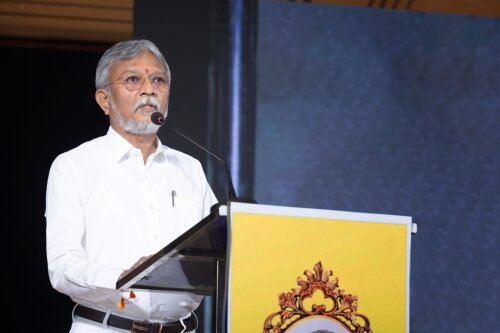Best Faith-Based Law Lawyers in Coimbatore
Share your needs with us, get contacted by law firms.
Free. Takes 2 min.
List of the best lawyers in Coimbatore, India
About Faith-Based Law in Coimbatore, India
Faith-based law in Coimbatore, as in the rest of India, refers to legal principles and rules derived from religious scriptures and traditions that apply to specific communities. India’s legal system recognizes and respects the personal laws of major religious communities, including Hindu, Muslim, Christian, Sikh, and others, particularly in matters such as marriage, divorce, succession, and inheritance. Coimbatore, being a diverse city in Tamil Nadu, has communities that abide by these traditions alongside the secular laws enacted by Parliament and the state legislature. Courts in Coimbatore adjudicate faith-based legal matters by combining statutory law and personal law, guided by the Indian Constitution and relevant legal precedents.
Why You May Need a Lawyer
There are several situations where individuals in Coimbatore may require the assistance of a lawyer experienced in faith-based law:
- Seeking advice on marriage, divorce, or maintenance governed by religious laws (e.g., Hindu Marriage Act, Muslim Personal Law).
- Understanding custody, guardianship, or adoption rights within a particular faith’s legal framework.
- Resolving inheritance and succession disputes arising from religion-specific rules.
- Overseeing religious charitable trusts, endowments, or managing religious property.
- Addressing violations of religious rights or discrimination within faith communities.
- Navigating interfaith marriages and legal implications.
- Compliance issues regarding religious festivals or community activities.
- Settling disputes over religious conversions, rituals, or ceremonies.
- Guidance on compliance with both personal and secular law.
Local Laws Overview
In Coimbatore, faith-based legal issues are addressed within the framework of Indian law. Key aspects include:
- Hindu Law: Governed by statutes such as the Hindu Marriage Act, 1955; Hindu Succession Act, 1956; Hindu Adoption and Maintenance Act, 1956, applicable to Hindus, Buddhists, Jains, and Sikhs.
- Muslim Law: Based on Shariat (Muslim Personal Law Shariat Application Act, 1937), addressing marriage (Nikah), divorce (Talaq), inheritance, and maintenance among Muslims.
- Christian Law: The Indian Christian Marriage Act, 1872 and the Indian Divorce Act, 1869 govern Christians in matters of marriage and divorce.
- Secular Laws and Special Laws: The Special Marriage Act, 1954 allows individuals of different faiths to marry without converting, while overarching acts like the Guardians and Wards Act, 1890 can apply in matters of child custody, irrespective of faith.
- State Laws & Customary Practices: Some local customary laws or practices may be recognized if not in conflict with central laws.
- Religious Endowments: Religious and charitable trusts and temples may be governed by the Tamil Nadu Hindu Religious and Charitable Endowments Act, 1959.
Frequently Asked Questions
What is faith-based or personal law in India?
Faith-based or personal law refers to religiously inspired laws that govern family and related matters such as marriage, divorce, succession, and maintenance for different religious communities.
How is faith-based law applied in Coimbatore courts?
Courts in Coimbatore apply personal laws as per the religious identity of the parties involved, alongside applicable central and state laws. Judges also ensure compliance with constitutional principles.
Can interfaith marriages take place under religious personal laws?
Interfaith marriages are generally registered under the Special Marriage Act, 1954, which allows people of different faiths to marry legally without conversion.
How are property and inheritance disputes resolved under faith-based law?
Inheritance and succession are determined by the relevant personal law of the deceased’s faith. For instance, the Hindu Succession Act applies to Hindus, while Muslim inheritance is governed by Shariat.
Are there legal protections for religious rights in Coimbatore?
Yes, the Indian Constitution protects religious freedom. Coimbatore courts can uphold these rights and offer remedies in case of violation or discrimination.
What should I do if there is a conflict between secular law and personal law?
In cases where personal law conflicts with central or constitutional law, the latter prevails, especially on matters of fundamental rights, as interpreted by the courts.
How are religious trusts and endowments managed legally?
Religious trusts and temples in Coimbatore are regulated by the Tamil Nadu Hindu Religious and Charitable Endowments Act, 1959, and require compliance with specific registration and management rules.
Can I challenge a decision made by a religious authority in court?
Yes, if you believe a religious authority’s decision violates your legal or constitutional rights, you can challenge it in the civil courts in Coimbatore.
What are common family law issues handled under faith-based law?
Marriages, divorces, child custody and guardianship, maintenance and alimony, succession, and adoption are commonly handled under faith-based law.
Do I need a lawyer for faith-based matters?
While not mandatory for all cases, legal representation is highly recommended for navigating the complexities of personal law and ensuring your rights are fully protected, especially during disputes or legal documentation.
Additional Resources
If you seek further information or assistance with faith-based law in Coimbatore, the following resources can be helpful:
- District & Sessions Court, Coimbatore: Handles civil and family cases, including those involving personal law.
- Legal Services Authorities: The Tamil Nadu State Legal Services Authority and Coimbatore District Legal Services Authority provide free or subsidized legal aid for eligible persons.
- Local Bar Associations: Can refer you to experienced lawyers specializing in personal and religious law.
- Women’s Rights Organizations: Offer support regarding family law matters, especially relating to marriage or domestic disputes.
- Department of Hindu Religious and Charitable Endowments, Tamil Nadu: Manages temple-related and trust legalities.
- Online Legal Information Platforms: Offer articles and explanations of Indian personal law in simple language.
Next Steps
If you need legal assistance in the field of faith-based law in Coimbatore, consider the following steps:
- Identify your specific issue and gather all relevant documents (marriage certificates, deeds, trust documents, etc.).
- Contact a qualified lawyer specializing in faith-based law through the local bar association or reference from friends or family.
- If financial resources are limited, approach the District Legal Services Authority for potential legal aid.
- For urgent disputes or protection of rights, visit the District & Sessions Court or seek advice through helplines.
- Research your rights under both your personal laws and secular Indian law to be better informed when meeting with your lawyer.
- Prepare a summary of your issue to discuss clearly during consultations.
Lawzana helps you find the best lawyers and law firms in Coimbatore through a curated and pre-screened list of qualified legal professionals. Our platform offers rankings and detailed profiles of attorneys and law firms, allowing you to compare based on practice areas, including Faith-Based Law, experience, and client feedback.
Each profile includes a description of the firm's areas of practice, client reviews, team members and partners, year of establishment, spoken languages, office locations, contact information, social media presence, and any published articles or resources. Most firms on our platform speak English and are experienced in both local and international legal matters.
Get a quote from top-rated law firms in Coimbatore, India — quickly, securely, and without unnecessary hassle.
Disclaimer:
The information provided on this page is for general informational purposes only and does not constitute legal advice. While we strive to ensure the accuracy and relevance of the content, legal information may change over time, and interpretations of the law can vary. You should always consult with a qualified legal professional for advice specific to your situation.
We disclaim all liability for actions taken or not taken based on the content of this page. If you believe any information is incorrect or outdated, please contact us, and we will review and update it where appropriate.











